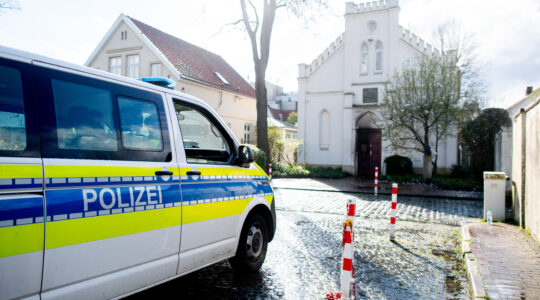DUSHANBE, Tajikistan (JTA) — Nearly a year after the small Bukharan Jewish community in this Central Asian country lost its only synagogue, Tajikistan’s Jews got a new one.
The local government demolished the country’s synagogue in Dushanbe, the capital, last June to make way for a new presidential palace and national park. Some in Tajikistan’s 250-member Jewish community had protested the demolition order, saying it would halt both prayer services and a food aid program for infirm and poor Jews.
But the government went ahead with the demolition, offering the Jews a plot of land elsewhere to build their synagogue.
On May 4 the community, which is mostly descended from Persian-speaking Bukharan Jews who have lived in Central Asia for centuries, dedicated their new synagogue in a residential neighborhood about 10 minutes by car from central Dushanbe.
“We didn’t want to lose our old synagogue,” said Mikhael Abdurahmonov, head of the Tajik Jewish community. “That synagogue was historical and precious to us because it was a prayer center and a social gathering spot. But this place is much nicer and bigger.”
Tajik businessman and philanthropist Hasan Assadullozoda presented the synagogue compound as a gift to the Jewish community.
Abdurahmonov said Assadullozoda, the owner of Orient-Bank Tajikistan and the brother-in-law of Tajik President Emomali Rahmon, said a Jewish friend of Assadullozoda’s in New York persuaded him to donate the structure to the Jewish community for use as a synagogue. It had been a private home.
“Now we can put up a sign that this is a Jewish synagogue. We will name it Jewish-Tajik Friendship,” said Abdurahmonov, who thanked “the Tajik nation for letting us have a synagogue here.”
The two-story structure, which will serve as a synagogue and community center, consists of a carpeted glass-walled hallway along one side, multiple rooms of varying size and an adjacent courtyard with patio and grass.
The building will include a Hebrew school classroom, a conference room for Jewish visitors from overseas, a bedroom for guests and a sanctuary. Meals will be served to the poor and elderly in a room with two rows of tables and chairs.
The interior of the house is mostly unfurnished for now.
“The situation of the Jewish people depends on the condition of their synagogue and their lifestyle,” Abdurahmonov said when asked about the future of the Jewish community here. “If we can make this new cultural center and synagogue better, the Jewish people will stay and maybe we will get bigger.”





